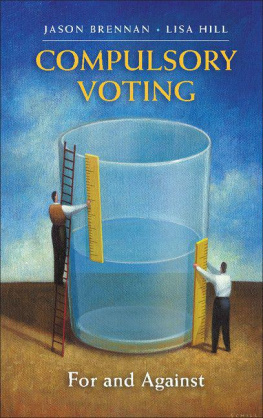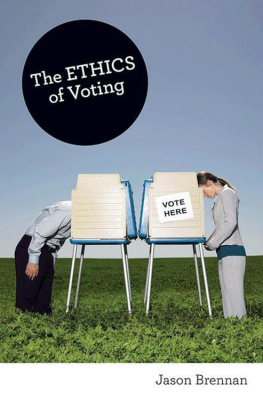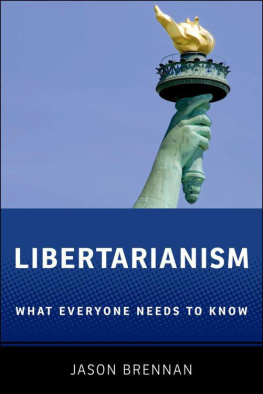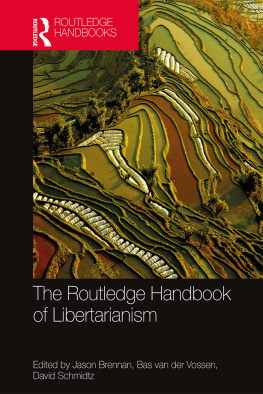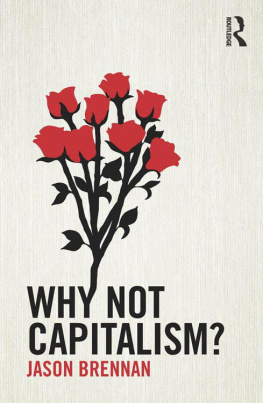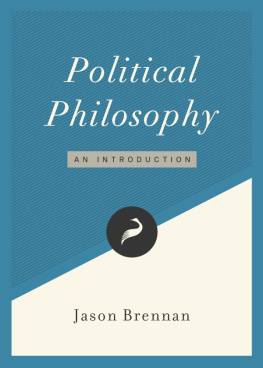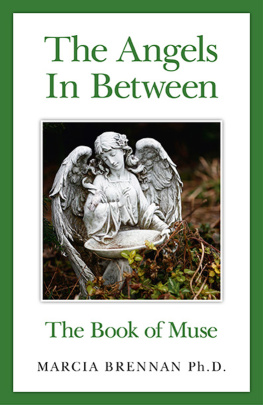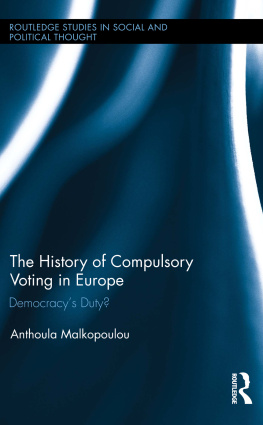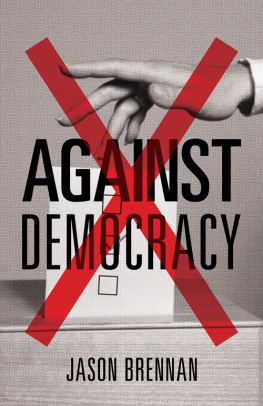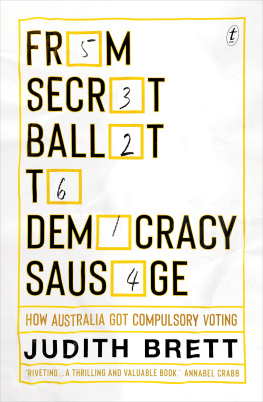Jason Brennan - Compulsory Voting: For and Against
Here you can read online Jason Brennan - Compulsory Voting: For and Against full text of the book (entire story) in english for free. Download pdf and epub, get meaning, cover and reviews about this ebook. year: 2014, publisher: Cambridge University Press, genre: Science. Description of the work, (preface) as well as reviews are available. Best literature library LitArk.com created for fans of good reading and offers a wide selection of genres:
Romance novel
Science fiction
Adventure
Detective
Science
History
Home and family
Prose
Art
Politics
Computer
Non-fiction
Religion
Business
Children
Humor
Choose a favorite category and find really read worthwhile books. Enjoy immersion in the world of imagination, feel the emotions of the characters or learn something new for yourself, make an fascinating discovery.
- Book:Compulsory Voting: For and Against
- Author:
- Publisher:Cambridge University Press
- Genre:
- Year:2014
- Rating:4 / 5
- Favourites:Add to favourites
- Your mark:
- 80
- 1
- 2
- 3
- 4
- 5
Compulsory Voting: For and Against: summary, description and annotation
We offer to read an annotation, description, summary or preface (depends on what the author of the book "Compulsory Voting: For and Against" wrote himself). If you haven't found the necessary information about the book — write in the comments, we will try to find it.
Compulsory Voting: For and Against — read online for free the complete book (whole text) full work
Below is the text of the book, divided by pages. System saving the place of the last page read, allows you to conveniently read the book "Compulsory Voting: For and Against" online for free, without having to search again every time where you left off. Put a bookmark, and you can go to the page where you finished reading at any time.
Font size:
Interval:
Bookmark:
In many democracies, voter turnout is low and getting lower. If the people choose not to govern themselves, should they be forced to do so?
For Jason Brennan, compulsory voting is unjust and a petty violation of citizens liberty. The median nonvoter is less informed and rational, as well as more biased, than the median voter.
According to Lisa Hill, compulsory voting is a reasonable imposition on personal liberty. Hill points to the discernible benefits of compulsory voting and argues that high-turnout elections are more democratically legitimate.
The authors both well known for their work on voting and civic engagement debate such questions as
- Do citizens have a duty to vote, and is it an enforceable duty?
- Does compulsory voting violate citizens liberty? If so, is this sufficient ground to oppose it? Or is it a justifiable violation? Might it instead promote liberty on the whole?
- Is low turnout a problem or a blessing?
- Does compulsory voting produce better government? Or might it instead produce worse government? Might it, in fact, have little effect overall on the quality of government?
JASON BRENNAN is Assistant Professor of Strategy, Economics, Ethics, and Public Policy at the McDonough School of Business and Assistant Professor of Philosophy at Georgetown University. Formerly, he was Assistant Professor of Philosophy at Brown University, where he was also Assistant Director of the Political Theory Project, an interdisciplinary research center. He received his PhD in philosophy from the University of Arizona in 2007. Brennan is the author of Libertarianism: What Everyone Needs to Know (2012); The Ethics of Voting (2011); and, with David Schmidtz, A Brief History of Liberty (2010).
LISA HILL is Professor of Politics at the University of Adelaide, and formerly an ARC Senior Fellow (University of Adelaide) and a five-year Fellow in the Political Science Program, Research School of Social Sciences, Australian National University. Prior to that she was a lecturer in Government at the University of Sydney and took a D. Phil. in Politics at the University of Oxford. Her current areas of interest are political theory, history of political thought, and issues in electoral law. In 2011 Hill was elected a Fellow of the Academy of the Social Sciences of Australia. Her most recent book, co-authored with Bruce Buchan, is An Intellectual History of Political Corruption (2014).


Jason benefited greatly from discussing these issues with his colleagues at Georgetown and elsewhere. He thanks Loren Lomasky, John Hasnas, Dennis Quinn, Peter Jaworski, Bryan Caplan, John Tomasi, David Estlund, Peter Boettke, Geoffrey Brennan, David Schmidtz, Matt Zwolinski, Kevin Vallier, Bas van der Vossen, Andrew J. Cohen, Andrew I. Cohen, Hlne Landemore, William Galston, Alfred Apps, the philosophy department at Georgia State University, and the audience and fellow panelists at the American Political Science Association 2013 Annual Meeting. Thanks especially to Lisa Hill for agreeing to work on this project.
Lisa Hill wishes to thank her research assistants, Brendan Drew, Carolyn Walsh, and especially Kelly McKinley, for their able assistance in the completion of this manuscript as well as the Australian Research Council, whose funding made its completion possible. She also thanks Jason Brennan for conceiving this project and generously suggesting it to her.
We are both grateful to editors at the New York Times , who helped bring us together in the first place to debate this topic, and to Robert Dreesen at Cambridge University Press for his support for this project.
Democracy is rule by the people. But what if the people refuse to rule? Many people worry if we do not have government by the people, then we will not have government for the people at least not for all of them.
During presidential elections in the late nineteenth century, 7080 percent of eligible Americans voted. For whatever reason, in the twentieth century, participation rates seem to have dropped to 5060 percent. Midterm national, state, and local elections averaged a mere 40 percent.
A U.S. president has never been elected by a majority of eligible voters. In the 1964 election, 61.05 percent of voters cast their ballots for Lyndon Johnson the largest majority any president has ever enjoyed. Yet, at the same time, because turnout was so low, Johnson was in fact elected by less than 38 percent of all voting-eligible Americans. We call Reagans 1984 victory a landslide, but less than a third of voting-age Americans actually voted for him. Less than a quarter of eligible Americans voted to reelect Bill Clinton in 1996. In all elections, a minority of the voting-eligible population imposes a president on the majority.
When most people hear these numbers, they shake their heads and wring their hands. They conclude that Americans fail to take the responsibility of self-government seriously. They worry that Americans especially young adults, of course are complacent, apathetic, and self-centered. I have heard conservative Americans complain, Our brave troops died to protect our democratic freedoms, yet half of us cant be bothered to vote. The thought: democratic apathy means they died in vain.
Font size:
Interval:
Bookmark:
Similar books «Compulsory Voting: For and Against»
Look at similar books to Compulsory Voting: For and Against. We have selected literature similar in name and meaning in the hope of providing readers with more options to find new, interesting, not yet read works.
Discussion, reviews of the book Compulsory Voting: For and Against and just readers' own opinions. Leave your comments, write what you think about the work, its meaning or the main characters. Specify what exactly you liked and what you didn't like, and why you think so.

